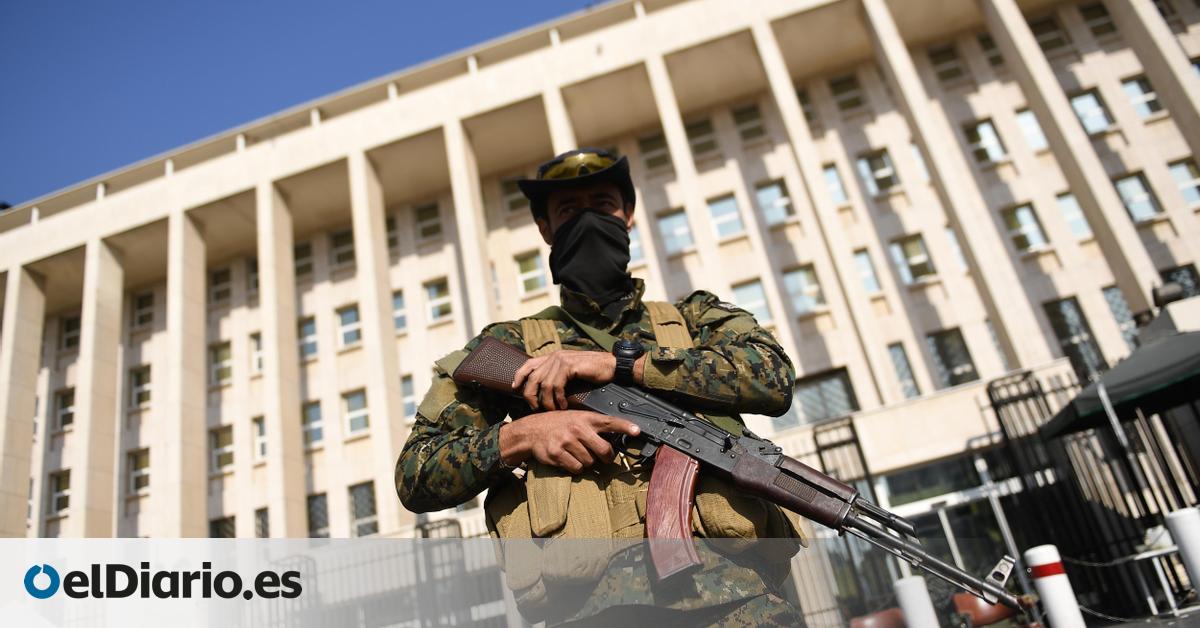
Following the confirmation on Sunday night that Bashar Al Assad and his family are in Russia, far from Syria, the millions of people who have been subject to his dictatorship for decades have been able to sleep more peacefully in the country, while thousands of refugees who fled during the civil war have begun to return.
The Syrian capital, Damascus, from which Al Assad escaped before the assault of the insurgents, led by the Islamist Levant Liberation Organization (Hayat Tahrir al Sham, in Arabic) – former Al Qaeda in Syria – has been calm this Monday and the city tries to resume its activity in this new stage full of expectations and uncertainty.
Most shops and public offices have remained closed, while queues have formed at bakeries and the few open food stores, according to the AP news agency. The Syrian newspaper Al Watan – until yesterday a fervent defender of the regime – has also reported that private vehicles are circulating normally and public transport will resume in the capital on Tuesday.

One of the legacies of the decades of dictatorship and war is that there are hardly any international correspondents in Syria and local journalists are accustomed to working under strong control and censorship. The press is one of the sectors that will need to be completely rebuilt.
The government of the regime, under the orders of Al Jolani
The Syrian Prime Minister, Mohamed Ghazi al Jalali, who from the first moment extended his hand to the armed opponents, met this Monday with the leader of Hayat Tahrir al Sham, Abu Mohamad Al Jolani, to coordinate the transition of powers and ensure that basic services continue to function, as reported by the Syrian news agency SANA – which has changed its logo to the three green stars of the opposition flag.
Al Jalali has told Sky News Arabia television that he and his team are prepared to continue their administrative work pending the formation of a new governing body. But this Monday the coalition of armed factions, under the name of Military Operations, has made its first executive decisions at the head of the new Syria.
First of all, they have announced a general amnesty for all compulsorily recruited soldiers and have guaranteed their safety. They have also assured that refugees can return to the country through the borders with neighboring Jordan, Turkey, Lebanon and Iraq.
Among the first declarations of intentions of the insurgents is the maintenance of public institutions, so that the administrative apparatus continues to function and basic services are not affected. State officials, who until last week were under the orders of the regime, will have to adapt to the sudden change that has taken place in about ten days.
The UN humanitarian coordinator for Syria, Adam Abdelmoula, regretted in statements to the AP that a plane loaded with urgent medical supplies could not be unloaded because employees in the civil aviation sector had abandoned their posts. According to Abdelmoula, the public sector “has been completely and abruptly paralyzed” after the fall of the regime.
“This country has had a government for 53 years and, suddenly, those that the public media has been demonizing are now in charge in the capital,” he explained.
Israel takes advantage to expand its presence
This radical and sudden change in Syria has also surprised and alerted the neighbors of the Arab country, especially Israel, which this Monday ordered the Army to create a “security zone” in southern Syria, beyond the demilitarized zone. between both countries, according to a statement from the Minister of Defense cited by the EFE Agency. The head, Israel Katz, has called for ensuring full control of the demilitarized zone, located between the Golan Heights occupied since 1967 and Syrian territory, where troops were deployed on Sunday.

Israel deploys troops to Syrian territory after the fall
of the Al Assad regime
Golan Heights
occupied by
Israel
1949-1967
Ceasefire line
1967
Territory occupied by Israel
graphic: ignacio sanchez. SOURCE: BBC

Israel deploys troops to Syrian territory
after the fall of the Al Assad regime
Golan Heights
occupied by
Israel
1949-1967
Ceasefire line
1967
Territory occupied by Israel
graphic: ignacio sanchez. SOURCE: BBC
Israeli Defense Minister Gideon Saar has confirmed bombings against several military installations of the Syrian regime in Damascus and other parts of the country between Sunday and Monday, including chemical weapons warehouses, so that they do not fall into the hands of the insurgents.
“Israel is now bombing depots of what it calls strategic weapons and also destroying Syria’s military aircraft. And evidently Israel had known where they were for a long time, but never considered destroying them before because it was certain that the Al Assad regime would not use those weapons against Israel. In any case, he would use them against his own people,” Haizam Amirah Fernández, an analyst specialized in the contemporary Arab world, explains to elDiario.es.
The expert adds that Israel “has also invaded more territories in Syria, such as an area near Quneitra and Mount Hermon” and could “try to expand the occupation of Syrian territory, which is the Golan Heights.”
Egypt, Iraq and Qatar have condemned the presence of Israeli soldiers in the demilitarized zone between this country and Syria, considering that it represents a “dangerous development” and a “flagrant violation” of the 1974 agreement on the separation of troops from both countries. The UN has also considered the entry of the Israeli Army into the demilitarized zone as a violation of the territorial agreement between Israel and Syria.
On Monday night, Israeli planes attacked military ships in the Mediterranean port of Latakia, as well as weapons warehouses in several towns on the outskirts of that northwestern city, which was a stronghold of the Al Assad regime. The official radio of the Israeli Army has confirmed the destruction of “Syrian military vessels in the port of Latakia.”
Israeli aviation has been bombing Syria frequently since the beginning of the conflict in 2011 – with the pretext that the presence of Iranian and Lebanese Shiite militias posed a threat to its security – and Amirah Fernández believes that it will continue to do so in this new stage: “It’s not going to change. And in any case, for Israel the greatest threat is a democratic Syria where the rulers respond to their people.”
The analyst considers that Israel’s actions in Syria can have “an emotional impact” because they add “the element that there is an occupation and a threat.” “This does not help to stabilize the internal front and facilitate political agreements between the Syrian groups that aspire to participate in the transitional government and in the new stage,” he adds.
Another country that is closely following developments in Damascus is Jordan, which, in addition to hosting more than a million refugees, has security problems on its border with Syria. The Middle East expert details that “there is an element of border security, where rebel groups were already operating, although not Hayat Tahrir al Sham” and, on the other hand, “there is an element of the passage of people and goods across the borders.” , therefore it also has an economic dimension.” “There is another very important dimension for Jordan, which is the smuggling of illicit substances, starting with Captagon,” the so-called jihadist drug.
Finally, there is the issue of refugees, not only in Jordan but in all neighboring countries. “A stabilization of Syria means carrying out a return of many Syrians, not only refugees but also internally displaced people,” explains Amirah Fernández. “A single man has left Syria and hundreds of thousands, even millions, are going to return to their places of origin.”
Syrians want to return home
Thousands of Syrian citizens trying to return to their country have gathered since Sunday at the Al Masnaa border crossing between Lebanon and Syria, prompting authorities to tighten security. Lebanese television MTV has shown images of young Syrians who are crossing the border this Monday at unauthorized points because they were residing in Lebanon illegally and due to the urgency of returning to a homeland of which, in many cases, they have barely any memories.
Also at two border posts between Turkey and Syria, Cilvegozu and Oncupinar, hundreds of people rushed this Monday to cross into Syrian territory, after years of exile. Turkey hosts some three million refugees, the highest number of Syria’s neighboring countries, which, when the armed conflict began after the popular uprising of 2011, opened their doors to those fleeing bombings, persecution and compulsory enlistment. in the regime’s Army.
Ankara has been the main and only external ally of the insurgents in the last years of the conflict – even when they were cornered in Idlib -, which now gives it a leading role and great influence in the negotiation of the Syrian transition against other foreign powers. .
In a survey by the United Nations Refugee Agency (UNHCR) published in the middle of this year, 57% of Syrian refugees in neighboring countries expressed their hope of being able to return one day and 37% said they hoped to be able to do so. in the next five years. Probably, few could have imagined that this possibility would arise so soon and so unexpectedly.
Source: www.eldiario.es

